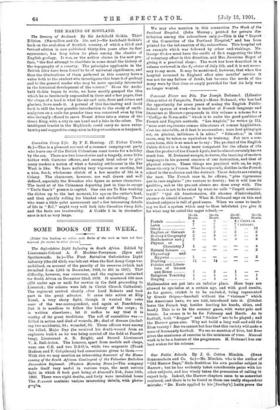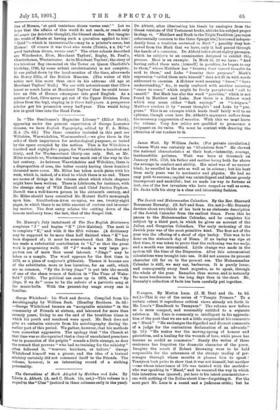Our Public Schools. By J'. G. Cotton Minchin. (Swan Sonnenschein
and Co. 6s.)—Mr. 3Iinchin, who is the author of "Old Harrow Days," finds doubtless his own peculiar subject in Harrow ; but he has evidently taken considerable pains with his other subjects, and has wisely taken the precaution of calling in expert help. Indeed, the Harrow chapters seem to us somewhat confused, and there is to be found in them one really stupendous mistake: "Dr, Keate applied to his [Shelley's] Latin prose the
line of Horace, et quid tentabam dicere versus erat.' " Let us hope that the affairs of this world do not reach, or reach only
bittcpdv (as Aristotle thought), the blessed shades. But imagine the wrath of Neste at having such a quotation applied to him ! t‘ Quid "— which is inconstruable —may be a printer's error, but Horace ! Of course it was Ovid who wrote (Tristia, 4 x. 24) "et quod tentabam dicere, versus erat." The other schools described are Winchester, Eton, Merchant Taylors', Rugby, St. Paul's, Charterhouse, Westminster. As to Merchant Taylors', the story of the tricolour flag t mounted on the Tower on Queen Charlotte's birthday, 1796, by some ardent revolutionists) is not complete. It was pulled down by the head-monitor of the time, afterwards Sir Henry Ellis, of the British Museum. (The writer of this notice met him more than once in his extreme old age at Merchant Taylors' Ball.) We see with astonishment that Clive learnt so much Latin at Merchant Taylors' that he could trans- late an Ode of Horace extempore into good English. As a matter of fact, Clive never got out of the Upper Division Form (three from the top), staying in it throe half-years. A prosperous scholar got his promotion every half-year. This would bring him in good time into the Head Form.







































 Previous page
Previous page